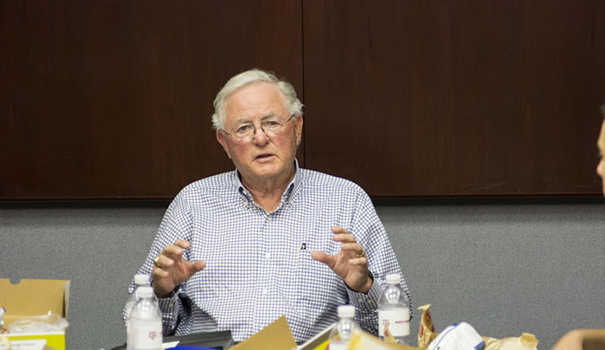Rockwell leader learned lessons, shared insights along the way
October 30, 2014
|
Mays Business School
Throughout his career, Don H. Davis Jr. ’61 was intentional about noticing the lessons he was learning as he helped his company and his fellow employees succeed. Ten years after retiring as CEO and earning the title of chairman emeritus of Rockwell Automation, Davis shared those lessons with Business Honors students at Mays Business School.
Davis earned a bachelor’s degree in mechanical engineering and an MBA from Texas A&M University. He said the engineering background and his penchant for logic and order provided a good basis for a business career. He said it also taught him how to analyze situations and to refrain from jumping to conclusions.
Davis took his first job in 1963 in Milwaukee with Allen-Bradley. Then he and his family moved to Birmingham, Ala., in 1965 — a place he said was not popular at the time because of Civil Rights unrest. But there he learned self-discipline, to take initiative and persevere. “When you really, really want something, you just don’t give up on it,” he said.
“My first job was the second-lowest job offer I got, financially, but I just knew that company was something I’d really enjoy working in,” he said. “That’s a lesson I’ll share with you — don’t always judge jobs by what everyone says you should consider. Go with your gut instinct.”
Davis became president of Allen-Bradley in 1989, after it was purchased by Rockwell International in 1985. Davis held a series of key corporate and business unit executive positions. In 1995 he was brought into Rockwell International as an executive vice president, then became president and chief executive officer in 1997.
As he was promoted and his responsibilities grew, he said, he learned about organizing things, became very decisive and learned the importance of candid, straightforward, non-ambiguous conversation.
Davis shared a set of lessons he had learned:
- How to get things done when you’re out of your comfort zone
- The importance of team. Even the leader is a part of the team.
- Be externally focused – and especially focused on the customers.
- The importance of “just plain common sense.” Common sense is not as common as it should be.
- Keeping a positive attitude regardless of terrible situations.
- The importance of getting the right people in the right jobs, including reassigning responsibilities as needed.
- Learn to operate with the resources you have, even if you have to reallocate some of them.
- Listening is a very important part of communications because you can learn more when you are listening than when you are talking.
Throughout his career, Davis learned the importance of making timely decisions even if the risks seemed high.
“Through every step of my career, my goal was to create the brightest future a person or that business had ever had,” he said. “Trust is the basis of leadership. You develop a trust over time with your integrity and your demand for excellence. That runs both ways so you can create an open environment where every person feels valued.”
ABOUT MAYS BUSINESS SCHOOL
Texas A&M University’s Mays Business School educates more than 5,600 undergraduate, master’s and doctoral students in accounting, finance, management, management information systems, marketing and supply chain management. Mays consistently ranks among the top public business schools in the country for its undergraduate and MBA programs, and for faculty research. The mission of Mays Business School is creating knowledge and developing ethical leaders for a global society.



